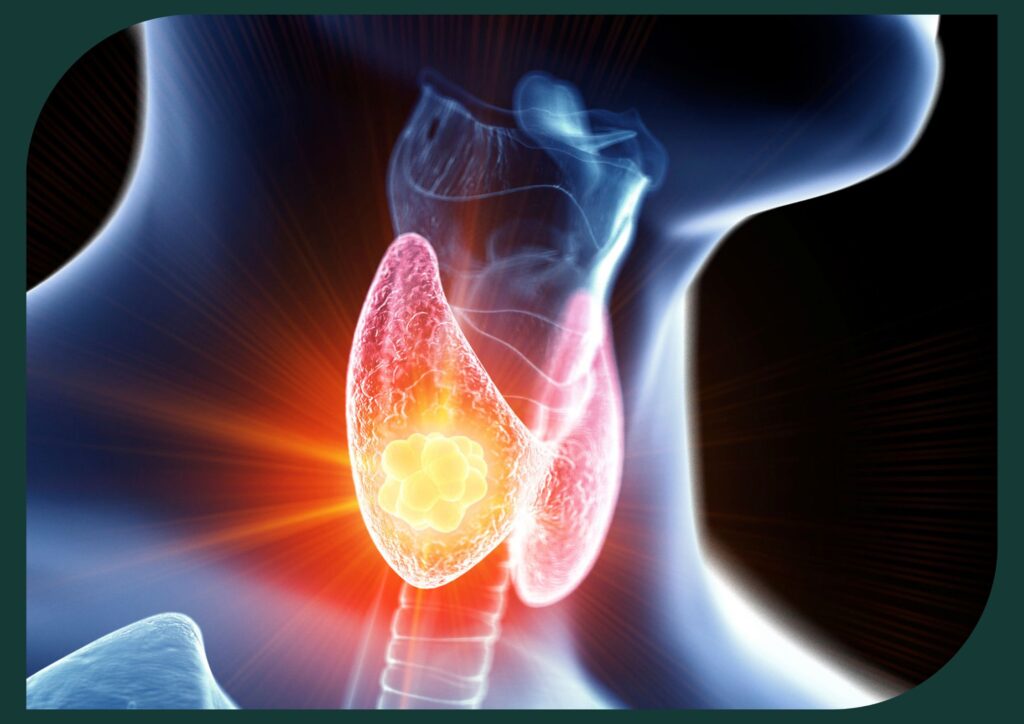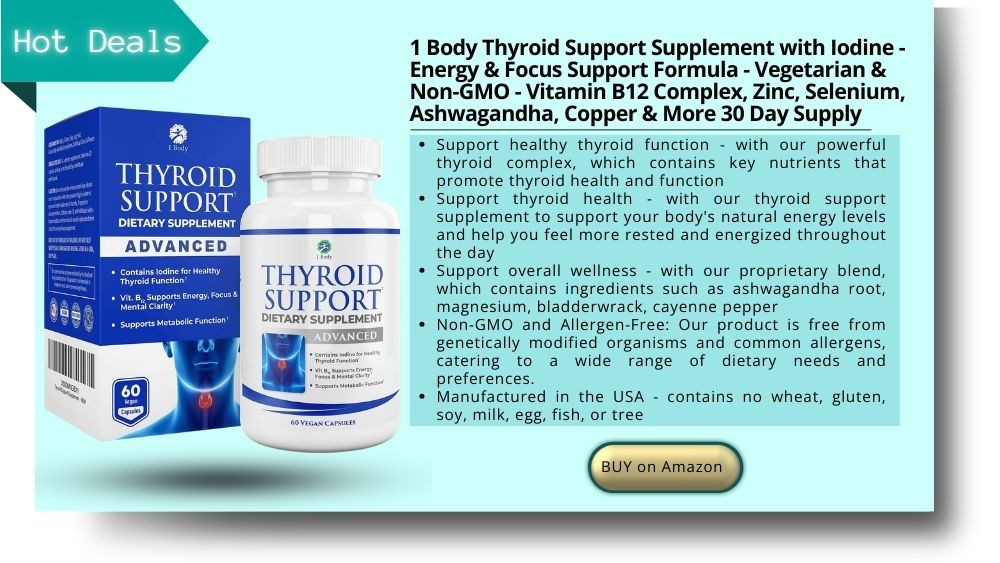As the years add to our lives, our bodies embark on an intriguing journey of transformations. Amidst this journey, an influential figure emerges—hypothyroidism.
This enigmatic condition arises when our thyroid gland decides to be a little idle, not producing enough thyroid hormones to keep you in optimal balance. What follows is a lot of symptoms that can sway your well-being and disrupt your harmonious existence.
In this article, we shall delve into the profound impact of hypothyroidism on aging, unearthing its subtle nuances and exploring the roads to relief through comprehensive insights into symptoms, treatment options, and the power of prevention.
Let’s embark on this journey together, where knowledge becomes our compass to a healthier and more vibrant life!
Contents
- 1 Everything You Need to Know About Hypothyroidism on Aging
- 2 Conclusion
Everything You Need to Know About Hypothyroidism on Aging
Hypothyroidism is a medical condition where the thyroid gland, responsible for producing vital thyroid hormones, operates at a reduced capacity.
These hormones play a vital role in controlling our metabolism, growth, development, body temperature, and energy levels. When the thyroid gland falls short of producing adequate amounts of tehse essential hormones, it can lead to a range of health concerns.

Prefer to listen rather than read?
The Thyroid Gland: An Overview
Before we explore the profound impact of hypothyroidism on the aging process, it is essential to lay a solid foundation by understanding the crucial role of the thyroid gland in our remarkable bodies.
Located in the neck, this gland controls and coordinates the production of essential hormones that are crucial for the body’s systems to work properly. The thyroid gland makes two important hormones: thyroxine (T4) and triiodothyronine (T3). These hormones regulate our metabolism and affect our growth and cognitive abilities.

Aging and Thyroid Function
Aging can impact the thyroid gland, resulting in decreased function. As we age, the production of thyroid hormones naturally decreases, potentially causing hypothyroidism. Additionally, hypothyroidism can worsen the effects of aging on energy levels, metabolism, and weight control.
Research has demonstrated that thyroid function naturally decreases with age, which can result in age-related thyroid dysfunction. This decline in thyroid hormone production with age is associated with an increased risk of developing hypothyroidism.
Age-related thyroid dysfunction encompasses a range of symptoms and health issues that arise from this decline in thyroid function. As the body ages, the thyroid gland may become less efficient in producing and regulating thyroid hormones.
Understanding the relationship between aging and thyroid function is crucial in identifying and managing thyroid-related conditions in older individuals. Regular monitoring of thyroid hormone levels and appropriate medical interventions can help mitigate the impact of age-related thyroid dysfunction and promote healthy aging.
Causes of Hypothyroidism
There are several factors that can cause hypothyroidism, including autoimmune disorders, radiation therapy, thyroid surgery, and certain medications.
Autoimmune Diseases
Autoimmune diseases, such as Hashimoto’s thyroiditis, are the most common main culprits in hypothyroidism. In this scenario, the body’s immune system mistakenly identifies the thyroid gland as a threat and launches an attack on it.
This immune response leads to inflammation and damage to the thyroid tissue, disrupting its normal function.

Hashimoto’s thyroiditis is a chronic condition that primarily affects women, although it can also occur in men. The exact cause of this autoimmune disease is not fully understood, but it is believed to involve a combination of genetic factors and environmental triggers.
Radiation Therapy and Medication
Introducing radiation therapy, a dual-purpose tool used in battling cancer. While it can save lives, it may also inadvertently impair the thyroid gland, leading to hypothyroidism. And we must not overlook the influence of specific medications, seemingly harmless yet capable of disrupting our thyroid function.
Iodine Deficiency
Iodine is a crucial element in the production of thyroid hormones. Without enough iodine, the thyroid gland cannot create these necessary hormones, resulting in hypothyroidism. Iodine deficiency is a leading cause of this condition globally.
Iodine is an essential mineral the body cannot produce, so it must be obtained through the diet. The thyroid gland uses iodine to produce thyroid hormones, namely thyroxine (T4) and triiodothyronine (T3).
When the body is deficient in iodine, the thyroid gland is unable to produce enough thyroid hormones to meet its needs. As a result, the body’s metabolic processes slow down, and various symptoms associated with hypothyroidism can manifest.
The consequences of iodine deficiency go beyond the development of hypothyroidism. It can also lead to the enlargement of the thyroid gland, known as a goiter, as the gland tries to compensate for the lack of iodine.
Genetic
Last but not least, genetics may play a significant role in thyroid function, with congenital conditions casting a shadow over the thyroid from the very beginning of life’s journey.
In some cases, individuals are born with congenital thyroid disorders that affect the development and function of the thyroid gland. These conditions are usually inherited and can impact thyroid hormone production right from birth or early infancy.
Symptoms of Hypothyroidism
Hypothyroidism can manifest through a range of symptoms, which can vary in severity from person to person. Some common symptoms include:
Fatigue
One of the primary symptoms of hypothyroidism is fatigue and low energy levels. This can significantly impact the overall well-being of older individuals, making it more challenging to engage in daily activities and maintain an active lifestyle.

The underactive thyroid gland fails to produce sufficient thyroid hormones, which are essential for energy production and metabolism. As a result, individuals may feel persistently tired and lacking in energy, even after getting adequate rest and sleep.
This fatigue can be debilitating and significantly impact daily activities and quality of life. Simple tasks may become more challenging, and individuals may find it difficult to maintain an active lifestyle.
Weight Gain
Hypothyroidism, characterized by an underactive thyroid gland, can have a significant impact on teh body’s metabolism, making it more challenging to maintain a healthy weight. The thyroid hormones play a crucial role in regulating metabolism, and when their production is reduced, the body’s metabolic rate decreases.
This slowdown in metabolism can lead to weight gain or difficulties in losing weight, even with diligent efforts to follow a balanced diet and engage in regular exercise.
When the metabolic rate is lowered, the body tends to store calories as fat rather than utilizing them for energy. This can result in an increase in body weight, often accompanied by a feeling of bloating and water retention.
Additionally, hypothyroidism can cause changes in appetite and food cravings, further contributing to weight gain.

The weight gain associated with hypothyroidism is usually gradual and can vary from person to person. It may be more pronounced in individuals who have a severe deficiency of thyroid hormones.
However, weight gain is often distributed throughout the body, including the face, abdomen, and extremities.
Cold Intolerance
Cold intolerance is a common symptom experienced by individuals with hypothyroidism. The underactive thyroid gland affects the body’s ability to regulate temperature, making individuals more sensitive to cold temperatures.
Thyroid hormones play a vital role in maintaining body temperature. They help generate heat and regulate the body’s thermoregulatory mechanisms.

In hypothyroidism, the decreased production of thyroid hormones disrupts these processes, leading to a reduced ability to generate and retain heat.
As a result, individuals with hypothyroidism may feel persistently cold, even in relatively mild temperatures. They may find themselves layering clothing, using extra blankets, or seeking heated environments to stay warm.
Exposure to cold temperatures can be uncomfortable and may exacerbate other symptoms associated with hypothyroidism, such as fatigue and muscle stiffness.
Cold intolerance can have a significant impact on daily life. It can affect an individual’s ability to engage in outdoor activities, make it challenging to tolerate air-conditioned environments, and contribute to discomfort and decreased productivity.

It is important for individuals with hypothyroidism to be mindful of their surroundings nad take necessary measures to stay warm and comfortable.
Dry Skin and Hair
Dry skin and hair are common manifestations of hypothyroidism. The insufficient production of thyroid hormones can disrupt the normal functioning of the skin and hair follicles, resulting in dryness and related symptoms.
Thyroid hormones play a crucial role in maintaining the skin’s moisture and regulating the activity of sebaceous glands.
In hypothyroidism, the reduced levels of thyroid hormones lead to decreased sebum production, which is responsible for keeping the skin lubricated and hydrated. As a result, individuals with hypothyroidism may experience dry, rough, and flaky skin that lacks natural moisture.
Furthermore, the impact of hypothyroidism extends to the hair, making it dry, coarse, and brittle. The inadequate supply of thyroid hormones affects the hair follicles, reducing their ability to produce healthy, vibrant strands. As a result, individuals may notice an increase in hair breakage, loss of shine, and a dull, lacklustre appearance.
In addition to dry skin and hair, individuals with hypothyroidism may also experience other dermatological symptoms, such as thinning eyebrows, skin discolouration, and a puffy face. These manifestations are often linked to hormonal imbalances and metabolic changes associated with the condition.
Diagnosis and Treatment
Diagnosing hypothyroidism requires a comprehensive evaluation that often involves a blood test to measure the levels of thyroid hormones in the body.
This test, known as the thyroid function test, primarily focuses on measuring the levels of thyroid-stimulating hormone (TSH) and thyroxine (T4). TSH is produced by the pituitary gland and stimulates the thyroid gland to produce thyroid hormones.

If the TSH levels are elevated while T4 levels are below the normal range, it indicates an underactive thyroid gland. In addition to the blood test, healthcare providers may also consider the individual’s symptoms, medical history, and physical examination findings when making a diagnosis.
Symptoms commonly associated with hypothyroidism include fatigue, weight gain, cold intolerance, dry skin, and depression.
Medications for Hypothyroidism
The most prevalent and effective treatment for hypothyroidism entails the use of synthetic thyroid hormones in the form of medication. This therapeutic approach is known as thyroid hormone replacement therapy, and it plays a crucial role in managing the condition.
The medication provides the body with essential thyroid hormones, such as levothyroxine, which the thyroid gland is unable to produce adequately on its own.
By administering synthetic thyroid hormones, the medication helps restore the hormonal balance in the body. As a result, it alleviates the symptoms caused by the underactive thyroid gland, such as fatigue, weight gain, cold intolerance, dry skin, and hair loss.
The therapy also supports normalizing the body’s metabolic rate, which is crucial for energy production, metabolism, and overall bodily functions.
Thyroid hormone replacement therapy is typically taken as a daily oral tablet, providing a consistent and controlled supply of hormones to the body.
Healthcare providers determine the appropriate dosage based on individual needs and regular monitoring of thyroid hormone levels. Visiting your doctor is crucial as this personalized approach optimizes treatment for each patient’s unique requirements.

It is essential for individuals undergoing thyroid hormone replacement therapy to adhere to their prescribed medication regimen diligently. Consistency and compliance with the treatment plan are crucial to achieving optimal outcomes and managing the condition effectively.
Furthermore, healthcare providers closely monitor the progress and response to treatment, periodically assessing thyroid function through blood tests. Adjustments in medication dosage may be made if necessary to maintain the appropriate hormone levels in the body.
Lifestyle Changes and Dietary Considerations
In addition to medication, incorporating certain lifestyle changes can greatly support thyroid health. One of the key aspects is maintaining a balanced diet that is rich in essential nutrients.
Specifically, ensuring an adequate intake of iodine, selenium, and zinc can be beneficial for optimal thyroid function. Foods such as seafood, dairy products, nuts, and whole grains are excellent sources of these nutrients and should be included in the diet.
Regular exercise plays a vital role in promoting overall well-being, including thyroid health. Engaging in physical activity helps boost metabolism, improve blood circulation, and support hormonal balance.
Additionally, incorporating stress management techniques, such as mindfulness meditation, deep breathing exercises, or yoga, can help reduce stress levels. Chronic stress can negatively impact thyroid function, so finding effective ways to manage stress is crucial.
Furthermore, prioritizing adequate sleep is essential for maintaining optimal thyroid health. Quality sleep allows the body to rest, repair, and regulate various bodily functions, including hormone production and metabolism.
By combining medication with these lifestyle changes, individuals with hypothyroidism can enhance their overall treatment outcomes and support their thyroid health effectively.
It is important to consult with healthcare professionals or registered dietitians to receive personalized recommendations and guidance regarding dietary modifications and lifestyle adjustments specific to individual needs.
Prevention and Management
While certain factors that contribute to the development of hypothyroidism, such as age and genetics, cannot be altered, individuals can still take proactive steps to prevent or effectively manage the condition.
One of the key preventive measures is maintaining a healthy lifestyle. This includes adopting a balanced diet that is rich in essential nutrients, particularly iodine, selenium, and zinc.
These nutrients play a crucial role in supporting thyroid function. Incorporating foods such as seafood, dairy products, nuts, and whole grains into the diet can help ensure an adequate intake of these nutrients.
Incorporating foods such as seafood, dairy products, nuts, and whole grains into the diet can help ensure an adequate intake of these nutrients.

Adopting a healthy lifestyle can contribute to overall well-being and support thyroid health. This includes eating a balanced diet, exercising regularly, managing stres levels, and getting enough sleep.
Regular exercise is also beneficial for overall health, including thyroid health. Engaging in physical activity helps promote metabolism, improve blood circulation, and support hormonal balance.
Additionally, stress management techniques, such as practising mindfulness, engaging in relaxation exercises, or seeking therapy, can help reduce stress levels. Chronic stress can potentially impact thyroid function, so finding effective ways to manage stress is important.

Regular check-ups and thyroid function tests are essential, especially for individuals who are at a higher risk of developing hypothyroidism. This includes individuals with a family history of thyroid disorders or those with autoimmune conditions.
Routine medical check-ups can help detect any thyroid-related issues early on. Regular monitoring of thyroid hormone levels allows for timely intervention and adjustments in treatment if necessary.
Furthermore, it is crucial to follow prescribed medication regimens diligently if diagnosed with hypothyroidism. Adhering to the prescribed dosage and schedule as directed by healthcare professionals helps maintain optimal hormone levels and effectively manage the condition.

Conclusion
Hypothyroidism can have a significant impact on the aging process, affecting energy levels, metabolism, and overall well-being. Understanding the symptoms, treatment options, and preventive measures is crucial in managing this condition effectively.
By adopting a proactive approach to thyroid health, individuals can lead fulfilling lives and age gracefully.



